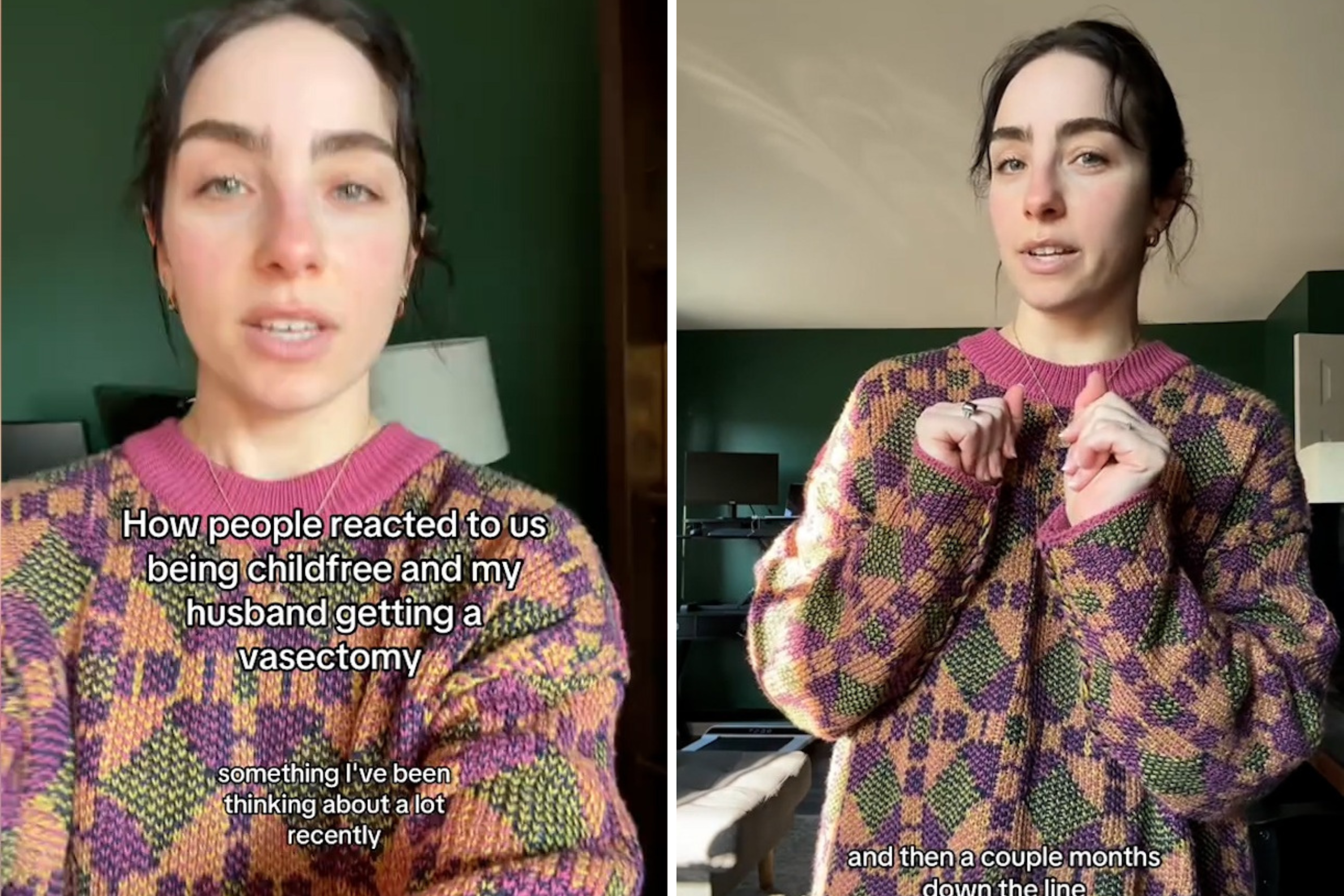World
Woman Accused of Convincing Husband To Get Vasectomy Reveals the Truth

The Conversation Starter: Breaking the Stigma Around Vasectomies
When Elise Morrison shares that her husband, Kurt, underwent a vasectomy, she’s often met with surprise, followed by a flurry of questions. People ask, “How did you convince him to do that?” or “Why are you making him do this?” These reactions reveal a deeper societal stigma surrounding male sterilization. However, Morrison is quick to clarify that no convincing was needed. On her TikTok account (@eliselm___), she shared their story, explaining that Kurt was fully on board with the decision after they agreed to remain child-free. For Morrison, a 32-year-old professional dancer and administrative coordinator from New Jersey, the conversation about family planning began years ago, and the decision to opt for a vasectomy was a joint one, free from pressure or hesitation.
The Reality of Vasectomies: A Growing Trend in Family Planning
In the U.S., approximately 500,000 vasectomies are performed each year, a number that has been steadily increasing. A study by the University of Chicago found a significant rise in vasectomy rates from 2014 to 2021, with a 26 percent relative increase among privately insured men aged 18-64. This trend may be linked to growing concerns over restricted abortion access, particularly before the 2022 Supreme Court ruling that overturned Roe v. Wade. Morrison herself noted that she felt grateful Kurt had his vasectomy before the election, as she wanted to ensure her reproductive options were protected in case of legal changes.
Despite the rising numbers, vasectomies remain a relatively uncommon form of birth control, and many men still face societal misconceptions about the procedure. Morrison has used her platform to challenge these stereotypes, emphasizing that the decision to undergo a vasectomy was a mutual one, made without pressure or coercion. “We make choices together and for the benefit of each other,” she explained. By sharing their experience, Morrison hopes to normalize the conversation around vasectomies and reduce the stigma surrounding male sterilization.
Challenging Societal Expectations: The Decision to Remain Child-Free
Morrison and her husband Kurt began discussing their decision to remain child-free after their engagement in 2021. Initially, they were undecided, with their views split 50/50. Over time, however, their perspective shifted to 70/30 in favor of not having children, and eventually, they made the firm decision to be child-free. This journey reflects Morrison’s broader observations about societal expectations surrounding parenthood. She notes that women, in particular, are often raised to view marriage, homeownership, and parenthood as inevitable milestones. “I used to think I wanted kids because I thought that’s just what you did,” she admitted. But as she reflected on her own desires, she realized how much of her mindset had been shaped by societal norms rather than personal preference.
For Morrison, the decision to remain child-free was both empowering and liberating. She emphasizes that parenthood is not for everyone, and that it’s okay to challenge societal expectations. By speaking openly about her choice, she hopes to help others feel less alone in their own journeys. Her message resonates with many, as evidenced by the comments on her TikTok post. One user wrote, “Why is it always ‘how did you convince him?’ WE make choices together and for the benefit of each other. He wanted to get one without me doing any convincing!! Ahhhh I feel this!” Another shared, “It never even ends. My husband and I are happily one and done, and he got fixed when our baby was 7 weeks old. People are still horrified.” These responses highlight the judgment many couples face when making unconventional choices about family planning.
Rethinking Reproductive Responsibility: The Role of Men in Contraception
Morrison’s story also sheds light on the broader issue of reproductive responsibility and the role of men in contraception. While vasectomies are a highly effective form of permanent birth control, the procedure is often overshadowed by the emphasis on female contraceptives. This imbalance reflects deeper societal attitudes about gender roles in family planning. Morrison’s experience challenges these norms, demonstrating that men can—and do—take an active role in reproductive decisions. By choosing to undergo a vasectomy, Kurt not only took responsibility for their shared decision to remain child-free but also alleviated the physical and emotional burdens often placed on women when it comes to contraception.
Conclusion: Breaking Down Barriers and Encouraging Open Conversations
Elise Morrison’s story is a powerful reminder of the importance of breaking down societal stigma and fostering open conversations about reproductive health. By sharing her experience, she hopes to help others feel less alone in their own journeys, whether that involves deciding to remain child-free or exploring permanent contraception options. As the trend of vasectomies continues to grow, it’s crucial for healthcare providers to offer better counseling and support for men and women considering permanent birth control. Morrison’s experience also underscores the importance of challenging societal expectations and embracing personal choices that align with individual values and goals. For those navigating similar dilemmas, Morrison’s advice is simple: trust your instincts, communicate openly with your partner, and don’t be afraid to make choices that work for you.
If you’re facing a family dilemma or have a story to share, consider reaching out to Newsweek at life@newsweek.com. Your story could be featured, and experts are available to offer guidance and support.











